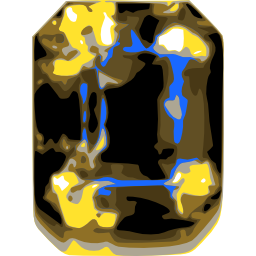Sound Processes is open source software. A graphical front-end or “desktop application” has been developed for Sound Processes, called Mellite, which is also open source under the GNU General Public License. Since a lot of work with Sound Processes will take place within Mellite, I often use their names interchangingly. I call Sound Processes a framework for experimental computer music and sound art, and I call Mellite an environment. It highlights the fact that you can write code using Sound Processes as a library, possibly selecting only a subset of its functionality, whereas Mellite is meant as a site in which one can structure compositions, and a workbench.
I sometimes abbreviate these two facets with SP and Mllt.
{function: Introduction, keywords: [_, open source, framework, environment]}
How do you represent a non-visual thing such as a software? If the name is a handle that alludes to something, but foremost allows you to mention-imagine it, an illustration could function the same way?
{kind: caption, keywords: [_, illustration, handle], group: cap-image}
Sound Processes is a computer music framework developed by Hanns Holger Rutz. It was started as part of his PhD research around 2009/2010, and forms one of the dispositifs used in the Algorithms that Matter project.
This RC exposition documents some of the thought processes and experiments pertaining to Sound Processes.
Publications
Several aspects of both the functionality and the development process have been documented in the format of academic publications, which are listed below.
On the epistemological underpinnings and the development process:
- Rutz, Hanns Holger. 2021. “Human-Machine Simultaneity in the Compositional Process.” In Handbook of Artificial Intelligence for Music, edited by Eduardo Reck Miranda, ch. 2. Springer International Publishing (forthcoming).
- Rutz, Hanns Holger. 2014. “Tracing the Compositional Process. Sound Art That Rewrites Its Own Past: Formation, Praxis and a Computer Framework.” PhD thesis, UK: Plymouth University. http://hdl.handle.net/10026.1/3116.
- Rutz, Hanns Holger. 2011. “Limits of Control.” In Proceedings of the 8th Sound and Music Computing Conference (SMC), edited by Serena Zanolla, Federico Avanzini, Sergio Canazza, and Amalia de Götzen, 155–60. Padova: Padova University Press. https://doi.org/10.5281/zenodo.849958
As a short overview:
- Rutz, Hanns Holger. 2014. “Sound Processes: A New Computer Music Framework.” In Proceedings of the Joint 11th Sound and Music Computing Conference and the 40th International Computer Music Conference, edited by Anastasia Georgaki and Georgios Kouroupetroglou, 1618–1626. Athens: National and Kapodistrian University of Athens. https://doi.org/10.5281/zenodo.850939
On questions of recording and retracing the digital footprint of the compositional process:
- Rutz, Hanns Holger, Eduardo Miranda, and Gerhard Eckel. 2010. “On the Traceability of the Compositional Process.” In Proceedings of the 7th Sound an Music Computing Conference (SMC), 38:1–38:7. Barcelona. https://doi.org/10.5281/zenodo.849805
- Rutz, Hanns Holger, Eduardo Miranda, and Gerhard Eckel. 2011. “Reproducibility and Random Access in Sound Synthesis.” In Proceedings of the 37th International Computer Music Conference, 515–522. Huddersfield. http://hdl.handle.net/2027/spo.bbp2372.2011.104
- Rutz, Hanns Holger. 2012. “A Reactive, Confluently Persistent Framework for the Design of Computer Music Systems.” In Proceedings of the 9th Sound and Music Computing Conference (SMC), 121–129. Copenhagen. https://doi.org/10.5281/zenodo.850036
On specific sub-systems or abstractions within the framework:
- Rutz, Hanns Holger, and Robert Höldrich. 2017. “A Sonification Interface Unifying Real-Time and Offline Processing.” In Proceedings of the 14th Sound and Music Computing Conference (SMC), 50–57. Espoo. http://smc2017.aalto.fi/media/materials/proceedings/SMC17_p50.pdf
- Rutz, Hanns Holger. 2020. “A Pattern System for Sound Processes.” In Proceedings of the 15th International Conference on Audio Mostly, 93–100. Graz. doi: 10.1145/3411109.3411151
User Documentation
User manual, tutorials etc. are available from the Mellite website.
{kind: reference, keywords: [_, epistemology, compositional process]}



